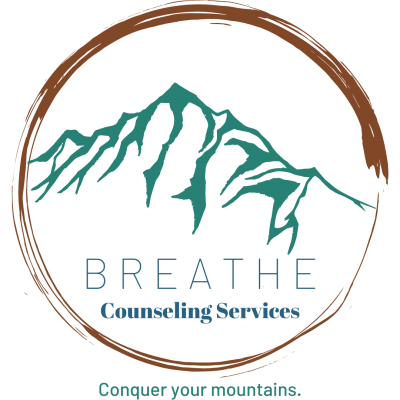How to Deal with Anxiety
Anxiety is a common and normal human emotion that everyone experiences from time to time. However, when anxiety becomes excessive or interferes with daily life, it can be a sign of an anxiety disorder.
Anxiety disorders can cause significant distress and impairment, but they are treatable with the right approach.
In this blog post, we will explore some effective strategies for dealing with anxiety.
One of the most effective ways to deal with anxiety is through therapy! Click here to book a session with one of our exceptional therapists.
How to Deal with Anxiety: Identify Triggers
The first step in dealing with anxiety is to identify what triggers your anxiety.
Triggers can be anything from a specific situation or person to a physical sensation or thought.
Once you identify your triggers, you can start to develop strategies for managing them.
Anxiety can be triggered by a wide range of situations, thoughts, and physical sensations. Here are some of the most common triggers for anxiety:
Stressful Life Events
Stressful life events such as a job loss, relationship breakup, financial difficulties, or health problems can trigger anxiety.
Phobias
Phobias are intense, irrational fears of specific objects or situations such as heights, spiders, or enclosed spaces. Exposure to the object or situation can trigger anxiety.
Stressful Social Situations
Social situations such as public speaking, meeting new people, or attending parties can trigger anxiety, especially for those with social anxiety disorder.
Physical Sensations
Physical sensations such as a racing heart, shortness of breath, or dizziness can trigger anxiety, especially for those with panic disorder.
Trauma
Traumatic events such as physical or sexual abuse, a natural disaster, or a car accident can trigger anxiety, especially for those with post-traumatic stress disorder (PTSD).
Genetics
There is evidence to suggest that genetics play a role in the development of anxiety disorders. Individuals with a family history of anxiety disorders may be more likely to experience anxiety themselves.
Chronic Illness
Chronic illnesses such as cancer, heart disease, or autoimmune disorders can trigger anxiety due to the uncertainty and stress associated with managing the illness.
Substance Use or Withdrawal
Substance use or withdrawal from drugs or alcohol can trigger anxiety, especially for those with a history of substance abuse.
Understanding these triggers for anxiety can be an important step in developing strategies for managing anxiety. If you are struggling with anxiety, it’s important to seek support from a mental health professional who can help you identify and manage your triggers.

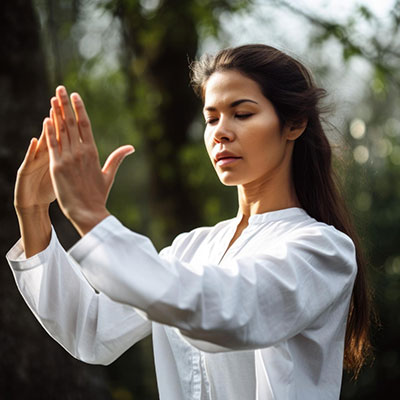
How to Deal with Anxiety: Practice Relaxation Techniques
Relaxation techniques can be very effective in reducing anxiety and promoting a sense of calm and relaxation. Here are some of the most effective relaxation techniques:
Deep Breathing
Deep breathing is a simple and effective relaxation technique that can be done anywhere. To practice deep breathing, sit or lie down in a comfortable position and inhale deeply through your nose for a count of 4. Hold your breath for a count of 7, and then exhale slowly through your mouth for a count of 8. Repeat this cycle several times, focusing on your breath.
Progressive Muscle Relaxation
Progressive muscle relaxation involves tensing and then relaxing different muscle groups in the body. This can help release tension and promote relaxation. To practice progressive muscle relaxation, start by tensing the muscles in your feet for a few seconds, and then relax them completely. Move up your body, tensing and relaxing each muscle group as you go.
Visualization
Visualization involves creating a mental image of a peaceful or relaxing scene, such as a beach or a forest. To practice visualization, close your eyes and imagine yourself in this scene, using all of your senses to create a vivid mental image. Focus on the sights, sounds, and sensations of the scene, and allow yourself to feel a sense of calm and relaxation.
Mindfulness Meditation
Mindfulness meditation involves paying attention to the present moment without judgment. This can help reduce anxiety and promote a sense of calm and relaxation. To practice mindfulness meditation, sit in a quiet place and focus on your breath. If your mind wanders, gently bring your focus back to your breath.
Yoga
Yoga is a physical and mental practice that involves a combination of movement, breathing, and relaxation. Regular yoga practice can help reduce anxiety and promote overall well-being. There are many different styles of yoga, so it’s important to find a style that works for you.
Tai Chi
Tai Chi is a gentle form of exercise that involves slow, flowing movements and deep breathing. Regular Tai Chi practice can help reduce anxiety and promote relaxation and balance.
By incorporating one or more of these relaxation techniques into your daily routine, you can reduce anxiety and promote a sense of calm and relaxation. It’s important to find the techniques that work best for you and to practice them regularly for maximum benefit.
How to Deal with Anxiety: Challenge Negative Thoughts
Challenging negative thoughts is an important part of managing anxiety and improving overall well-being.
Here are a few effective strategies for challenging negative thoughts:
Identify Negative Thoughts
The first step in challenging negative thoughts is to identify them. Pay attention to your thoughts and try to identify when you are engaging in negative self-talk. Write down these thoughts to help you recognize patterns and themes.
Question Your Thoughts
Once you have identified negative thoughts, ask yourself if they are true. Are they based on facts or assumptions? What evidence do you have to support or refute these thoughts? Challenging negative thoughts in this way can help you gain a more balanced perspective.
Consider Alternative Explanations
Sometimes negative thoughts are based on assumptions or interpretations that may not be accurate. Consider alternative explanations for the situation and try to view it from a different perspective. This can help you challenge negative thoughts and develop a more positive outlook.
Practice Positive Self-Talk
Positive self-talk involves replacing negative thoughts with positive ones. Instead of focusing on what went wrong, focus on what you did right. Replace negative self-talk with positive affirmations such as “I can do this” or “I am capable and strong.”
Use Evidence to Refute Negative Thoughts
Look for evidence that supports positive thoughts and refutes negative ones. For example, if you are feeling anxious about an upcoming presentation, remind yourself of times when you have successfully given presentations in the past. This can help build confidence and reduce anxiety.
Talk to a Trusted Friend or Professional
Talking to a trusted friend or mental health professional can provide a fresh perspective and help challenge negative thoughts. They can provide support and guidance as you work to challenge negative thoughts and develop a more positive outlook.
By challenging negative thoughts and developing a more positive outlook, individuals can reduce anxiety and improve overall well-being. It’s important to practice these strategies regularly and seek support from a mental health professional if negative thoughts persist despite your efforts to challenge them.


How to Deal with Anxiety: Exercise Regularly
Research shows that exercise is a powerful tool for reducing anxiety. Regular exercise helps reduce stress hormones, improve mood, and increase feelings of well-being. Even a short walk or stretching session can help reduce anxiety.
Exercise has many mental health benefits, including reducing symptoms of anxiety and depression, improving mood, and promoting overall well-being.
Exercise helps reduce stress hormones such as cortisol and adrenaline, while also increasing the production of endorphins, which are natural mood-boosters.
Regular exercise can also improve self-esteem and confidence, which can further contribute to a positive mood.
In addition to the mood-enhancing effects of exercise, it can also help individuals develop coping skills and resilience. By setting goals, pushing past perceived limits, and overcoming obstacles, individuals can develop a sense of mastery and control, which can translate to other areas of life.
Exercise can also provide a sense of social connection and support, especially if done in a group setting or with a workout partner. Overall, exercise is a powerful tool for promoting mental health and well-being, and should be incorporated into a comprehensive self-care routine.
How to Deal with Anxiety: Limit Caffeine and Alcohol
Caffeine and alcohol can both increase anxiety symptoms. It’s important to limit or avoid these substances if you are prone to anxiety.
Here are three effective strategies for limiting alcohol and caffeine:
Set Limits
Setting limits is an effective way to limit alcohol and caffeine consumption. For example, limit alcohol to one drink per day for women and two drinks per day for men, and limit caffeine to 400mg per day, which is roughly the equivalent of four cups of coffee. Setting clear limits can help individuals stay within healthy guidelines and avoid excess consumption.
Find Alternatives
Finding alternatives to alcohol and caffeine can help reduce consumption. For example, replace caffeinated drinks with herbal tea or water, and replace alcoholic drinks with non-alcoholic alternatives such as sparkling water or mocktails. These alternatives can provide a similar taste or sensation without the negative effects of alcohol or caffeine.
Create a Supportive Environment
Creating a supportive environment can also help limit alcohol and caffeine consumption. This may involve avoiding situations where alcohol or caffeine are readily available, such as parties or coffee shops, or finding supportive friends or family members who encourage healthy habits. Creating a supportive environment can help individuals stay on track with their goals and make healthy choices.
By incorporating these strategies into daily life, individuals can limit alcohol and caffeine consumption and improve overall well-being. It’s important to find the strategies that work best for you and to seek support from a healthcare provider or mental health professional if you need additional guidance or support.
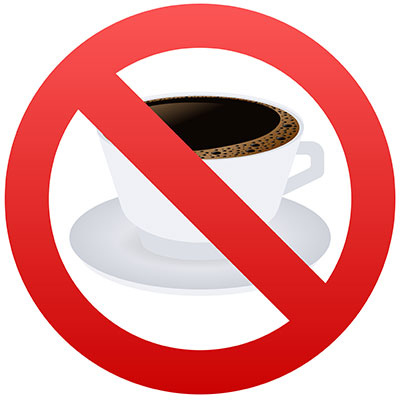
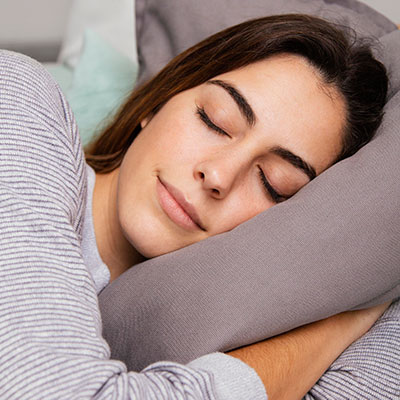
How to Deal with Anxiety: Get Enough Sleep
Sleep is essential for overall health and well-being, and it’s especially important for managing anxiety. Aim to get 7-9 hours of sleep per night, and establish a consistent sleep routine to help improve the quality of your sleep.
Getting enough sleep is essential for overall health and well-being. Here are some effective strategies for ensuring you get enough sleep:
Establish a Consistent Sleep Routine
A consistent sleep routine can help regulate the body’s internal clock and promote better sleep. Go to bed and wake up at the same time each day, even on weekends, to establish a consistent sleep routine.
Create a Relaxing Sleep Environment
Create a sleep environment that is conducive to restful sleep. This may involve adjusting the temperature, using blackout curtains or an eye mask, or using white noise or a sound machine to block out noise.
Limit Screen Time Before Bed
Exposure to screens, such as those on smartphones or tablets, can interfere with sleep. Limit screen time before bed and avoid using devices in the bedroom to promote better sleep.
Avoid Stimulants Before Bed
Stimulants such as caffeine or nicotine can interfere with sleep. Avoid consuming these substances before bed and opt for non-stimulating activities such as reading or listening to calming music.
Relaxation Techniques
Relaxation techniques such as deep breathing, meditation, or yoga can help calm the mind and promote relaxation, which can improve sleep.
Exercise Regularly
Regular exercise can help improve sleep quality, but it’s important to avoid exercising too close to bedtime, as it can interfere with sleep.
Avoid Alcohol and Heavy Meals Before Bed
Alcohol and heavy meals can interfere with sleep quality, so it’s important to avoid consuming these substances before bed.
By incorporating these strategies into daily life, individuals can improve sleep quality and promote overall well-being. It’s important to find the strategies that work best for you and to seek support from a healthcare provider or mental health professional if you need additional guidance or support.
How to Deal with Anxiety: Seek Support
Anxiety can be isolating, but it’s important to seek support from family, friends, or a mental health professional. Talking about your feelings and experiences can help reduce anxiety and provide a sense of connection and support.
Here are three ways someone suffering from anxiety can seek support:
Talk to a Mental Health Professional
A mental health professional, such as a therapist or counselor, can provide support and guidance for managing anxiety. They can help individuals develop coping strategies, challenge negative thoughts, and build resilience. Mental health professionals can also provide a safe and nonjudgmental space for individuals to talk about their feelings and experiences.
Join a Support Group
Support groups can provide a sense of connection and understanding for individuals with anxiety. These groups may be led by mental health professionals or peers with similar experiences. They can provide a safe space for individuals to share their experiences, learn coping strategies, and gain support from others.
Talk to a Trusted Friend or Family Member
Talking to a trusted friend or family member can provide a sense of connection and support for individuals with anxiety. It’s important to choose someone who is supportive and understanding, and who can provide a listening ear without judgment. Sharing feelings and experiences with a trusted loved one can provide a sense of relief and help individuals feel less alone.
By seeking support from a mental health professional, joining a support group, or talking to a trusted friend or family member, individuals with anxiety can find the support they need to manage their symptoms and improve their overall well-being. It’s important to find the support that works best for you and to seek professional help if anxiety persists despite your efforts to manage it.
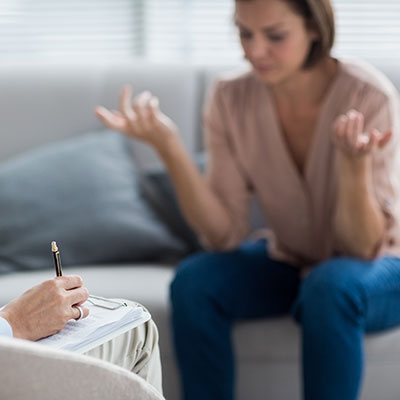
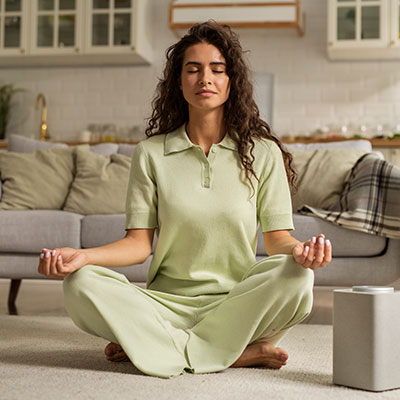
How to Deal with Anxiety: Practice Mindfulness
Mindfulness is a technique that involves paying attention to the present moment without judgment. This can help reduce anxiety and increase feelings of calm and relaxation. Mindfulness can be practiced through meditation, yoga, or simply by focusing on your breath.
Here are some specific ways you can practice mindfulness and reduce anxiety:
Meditation
Meditation is a formal practice of mindfulness that involves sitting in a quiet place and focusing on the present moment. This can be done by focusing on the breath, a specific sensation, or a visualization. Meditation can be practiced for as little as 5-10 minutes a day and can be a powerful tool for reducing anxiety and promoting relaxation.
Body Scan
A body scan is a mindfulness exercise that involves focusing on different parts of the body, one at a time, and noticing sensations without judgment. This can help individuals become more aware of their body and reduce tension and stress.
Mindful Breathing
Mindful breathing is a simple mindfulness exercise that can be done anywhere. It involves focusing on the breath and noticing the sensation of air moving in and out of the body. If the mind wanders, gently bring the focus back to the breath.
Mindful Eating
Mindful eating involves paying attention to the sensory experience of eating, such as the taste, texture, and smell of food. This can help individuals become more aware of their eating habits and develop a healthier relationship with food.
Mindful Movement
Mindful movement involves bringing awareness to the body during movement, such as during yoga or tai chi. By focusing on the sensations of movement, individuals can improve body awareness and reduce stress.
Mindful Listening
Mindful listening involves focusing on the sounds around you without judgment or distraction. This can help individuals become more present and aware of their environment.
Conclusion
By incorporating these mindfulness practices into daily life, individuals can improve their overall well-being and reduce anxiety. It’s important to find the mindfulness practices that work best for you and to practice them regularly for maximum benefit.
Dealing with anxiety can be challenging, but with the right strategies and support, it is possible to reduce anxiety and improve overall well-being.
By identifying triggers, practicing relaxation techniques, challenging negative thoughts, exercising regularly, limiting caffeine and alcohol, getting enough sleep, seeking support, and practicing mindfulness, individuals can develop a comprehensive approach to managing anxiety.
If anxiety persists despite these strategies, it’s important to seek professional help from a mental health professional.
